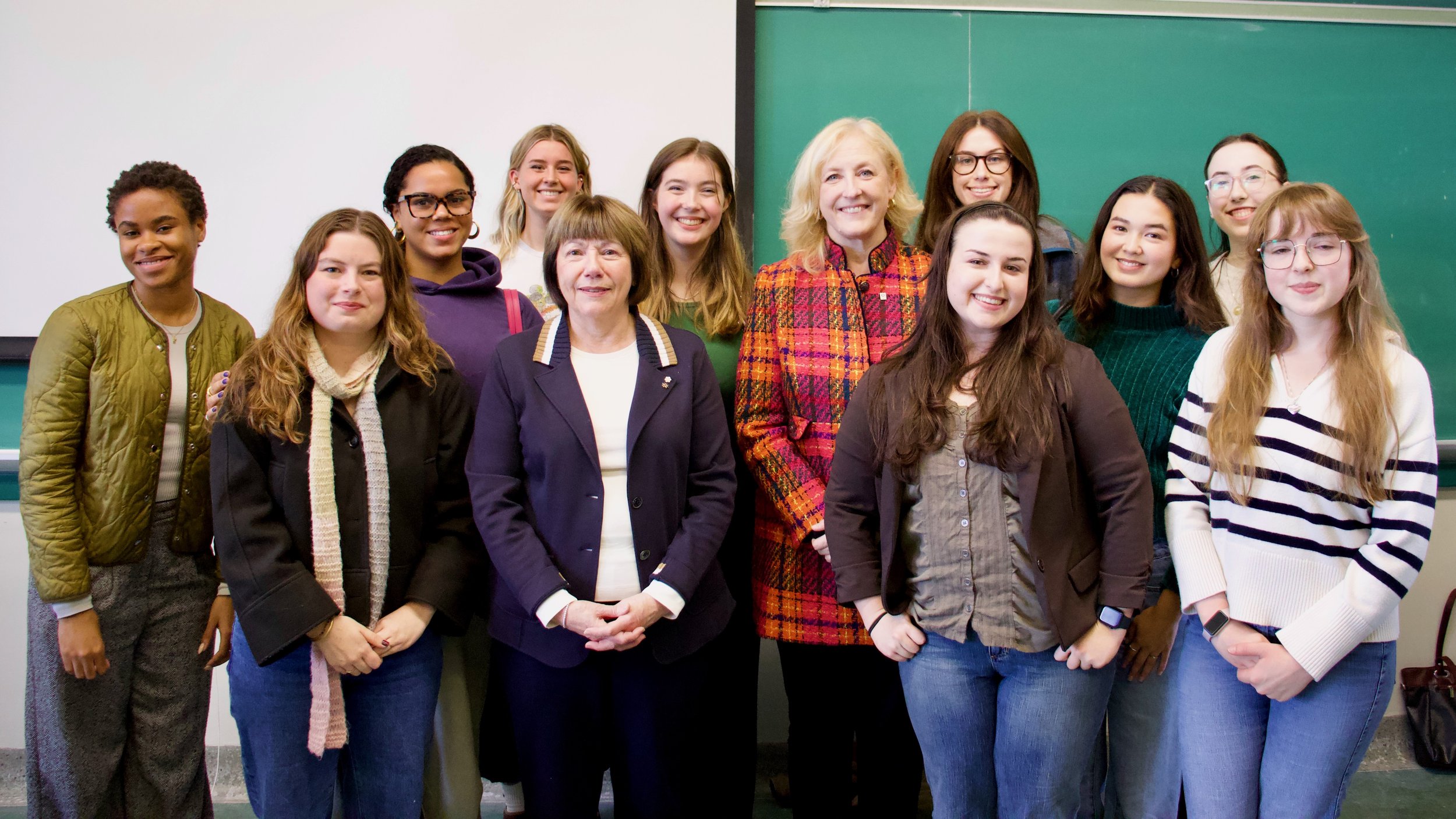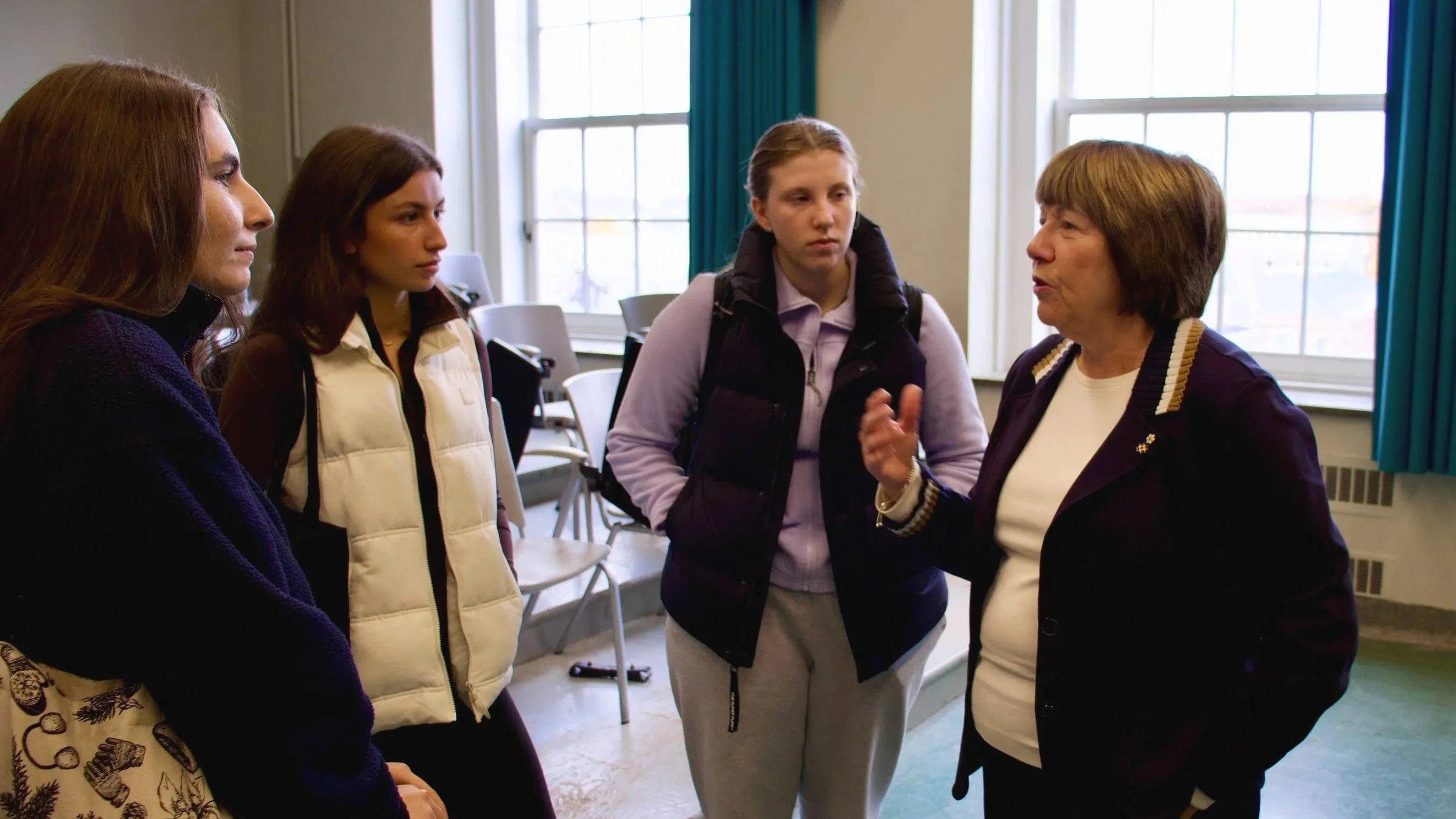Rural Canada is vital to enhancing Canada’s economic productivity, say Coalition co-chairs
Hon. Anne McLellan and Hon. Lisa Raitt, met with political science students at Dalhousie University in Halifax as part of the Coalition for a Better Future’s Campus Tour program. PHOTO: Coalition for a Better Future
Small towns and rural communities play a vital role in Canada's future, but are often overlooked when it comes to public policy. The conversation needs to change as Canadian governments and leaders work to reshape and boost the national economy, say the Coalition for a Better Future co-chairs.
“Much of Canada’s wealth generation still comes from outside major cities,” said Hon. Anne McLellan, one of the co-chairs. “If rural and small-town businesses aren’t considered a priority for infrastructure like reliable broadband, this directly limits their ability to compete in global markets. Imagine trying to sell to the world when your connection keeps cutting out.”
During their October visit to Dalhousie University in Halifax as part of the Campus Tour series, the co-chairs said the Coalition is focused not just on economic growth, but ensuring it’s both sustainable and inclusive.
“If rural and small-town businesses aren’t considered a priority for infrastructure like reliable broadband, this directly limits their ability to compete in global markets.”
Hon. Anne McLellan, co-chair, Coalition for a Better Future
“Sustainable growth” not only refers to protecting the environment but also ensuring long-term stability. Meanwhile, “inclusive growth” extends beyond gender and racial equity to encompass geographic inclusion, ensuring that communities outside major cities are not left behind.
Hon. Lisa Raitt, the other co-chair, noted that corporate and political decision-making often prioritizes urban needs, even though rural regions sustain key industries that frequently buffer Canada from global shocks.
Alberta served as an example. A student asked about regional disenfranchisement based on geography and region, seeking the co-chairs’ perspectives on engaging the private sector.
In response, McLellan highlighted that Alberta’s economy has evolved far beyond oil and gas. “Technology is booming in Calgary, which is the fastest-growing tech hub in North America,” she said. “And these technologies aren’t just for tech companies; they’re applied across oil and gas, agriculture, and manufacturing. The province is a huge driver of wealth in this country, and its private sector is key to building inclusive, innovative growth nationwide.”
Supported by Shell Canada, the Campus Tour series brings the co-chairs to post-secondary institutions across the country to engage with students about how public policy is integral to fostering a stronger, inclusive and sustainable economy, emphasizing young people's role in defining the future.
The event sparked a lively conversation about how public sector leaders, decision-makers, and the next generation of professionals can use data-driven insights for building a resilient economy that delivers shared prosperity in a rapidly changing world.
Long-term thinking in a short-term political cycle
The co-chairs outlined that the Coalition’s Scorecard of 21 metrics provides a framework —from living standards and workforce skills to global business scale and a greener economy—to assess whether the country is moving toward inclusive, sustainable growth.
“If we can hit each one of the Scorecard’s metric targets by 2030, Canada will be the most inclusive, sustainable economy growing at the speed we need to support the high quality of life we all expect,” said McLellan.
However, they noted that several indicators have worsened since they began tracking in 2020. Investment levels have softened, incomes are not rising quickly enough, and global forces—including shifts in the U.S. political landscape—are creating headwinds.
These challenges, Raitt noted, sit atop long-standing structural issues, with Canada’s recent run of minority governments creating additional pressures on longer-term planning. “When you’re in a minority, the focus becomes how to get a majority next time. That drives short-term policy decisions,” she said.
The Scorecard, Raitt added, aims to shift the short-term thinking giving policymakers—and the public—data that supports long-term, inclusive, and sustainable growth. “Data drives politics—and communicating with policymakers using data is the best way to move the system toward longer-term thinking.”
Audience questions immigration shifts, election lessons, and ‘power’
During an extended question-and-answer session, students raised issues ranging from immigration policy to federal leadership transitions and the increasing centralization of political power—issues that impact Canada’s economic growth.
Both Raitt and McLellan emphasized that immigration is necessary for Canada’s long-term economic and social survival. However, Raitt noted that rapid public policy changes have caused short-term shocks for universities and the labour market, with unintended consequences including straining social systems and fueling public resentment. McLellan added that careful communication is essential to prevent misinformation and polarization around immigration.
When asked about the recent federal election, Raitt highlighted the role of data in shaping outcomes, noting that “What the Conservatives miscalculated was how much the Liberal negative vote was tied to Mr. Trudeau.” She added that timing was also critical, pointing out that Mark Carney “had been waiting for decades to be the prime minister, and he found his time.”
McLellan echoed the importance of timing and a bit of luck in politics. “Leadership contests often hinge on being ready at the right moment. The moment came, and he won the leadership race.”
Students also asked about the growing concentration of power in the executive branch, often referred to as “executive creep.”
Raitt explained that the main check on this centralization is caucus management. “You can centralize powers in the Prime Minister’s Office or the Premier’s Office as much as you like,” she said, “but if you don’t keep your caucus on side, you’ll be booted by your own membership.” She added that laws allowing caucuses to remove their leaders do exist, “but these tools are not always exercised.”
Building on this, McLellan noted that central agencies, including the PMO and Privy Council Office, have increasingly constrained ministerial power. “Sure, every cabinet minister has a degree of power, but PMO is always looking over your shoulder. That can be good and bad,” she said, emphasizing that central oversight can sometimes limit ministers’ flexibility to respond to regional and sectoral needs.
Both co-chairs agreed that striking a balance between centralized oversight and ministerial and regional input is essential for crafting policies that support inclusive and sustainable economic growth.
‘A new golden age, if we get it right’
The topic of pessimism about Canada’s economic future among youth also came up, with recent polling showing increasing levels of concern.
Both McLellan and Raitt urged students to see this moment in Canada’s history as an opportunity for creativity and leadership to strengthen the country’s economic prospects.
“I’d rather be your age than mine right now,” said Raitt. “I think the opportunity is amazing, because I think Canada is finally going to do some stuff that's going to make sense for the country. This is your time. I’m excited about the future.”
“I think the opportunity is amazing, because I think Canada is finally going to do some stuff that's going to make sense for the country. This is your time. I’m excited about the future.”
Hon. Lisa Raitt, co-chair, Coalition for a Better Future
The co-chairs noted that the new federal government has begun speaking more specifically about long-term restructuring and major nation-building projects—economic initiatives, such as removing interprovincial trade barriers, that emphasize inclusivity and sustainability, which the Coalition has long championed.
McLellan echoed the sentiment, adding, “Be positive about the role you can play in the future—in your own lives, for the life of the country, and for your community. This can be a new golden age if we get this right, and you’re going to be at the very leading edge of that. There is nothing you cannot do.”




